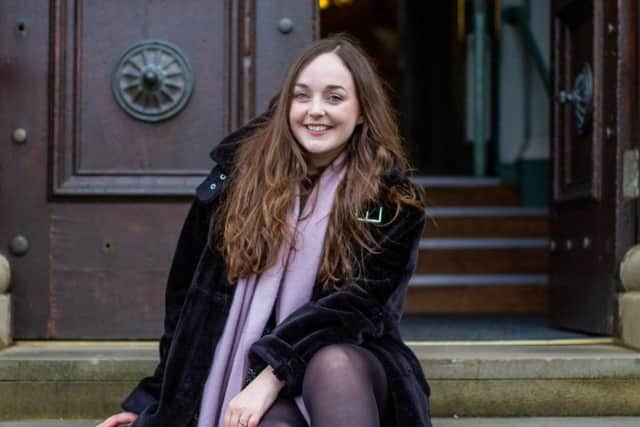Why Bradford author is putting victims not serial killer at the centre of her latest thriller
But when news unfolded about the horrific murder of Sarah Everard, Bradford-born Jess felt compelled to write. She was following the case from afar in her home in Sydney, Australia. “I remember seeing some reactions saying she shouldn’t have been walking home at that time…
"It always seems to be the way that instead of saying how do we protect women from perpetrators and stop people committing violence, [people are] saying how do women keep themselves safe?...There’s an attitude in society that we really need to deal with. It is not on women to keep themselves safe. It’s about stopping perpetrators.”
Advertisement
Hide AdAdvertisement
Hide AdThe crime set Jess on her way with finally putting pen to paper to develop an idea she had carried with her for some time. The result, Lucky Number 11, has recently been released and for Jess, a sexual assault survivor, it is a way to use her voice to re-centre narratives, focusing not on perpetrators but on victims and survivors instead. “A lot of thrillers and true crime stories tend to focus on the killer, almost like they’re this amazing phenomenon,” she reflects. “They’re not, there’s nothing that should be celebrated about them.”


"The book re-centres serial killer stories on survivors and puts the position of power and the voice back on them,” she continues. “In my opinion, it is them who should be heard, rather than the people who have committed these atrocities.”
Lucky Number 11 follows central character Hannah Allen, who was 14-years-old when she was abducted by an elusive serial killer, Peter Harris. Intended to be his eleventh victim, she was his only survivor. Ten years later, therapy and friendship have helped Hannah overcome the trauma of her past. But then a body is found and soon it becomes clear that someone is continuing Peter’s work.
Part of Jess’ inspiration for the book came from her own traumatic experience as a teenager, when she became the victim of a sexual assault. “At the time it happened, I didn’t actually tell anyone for two years. I kept it to myself and in my final year of school it all came out,” she recalls. “That time was just a blur…I almost picture a line in the sand and a Jess before and a Jess after...Even now, at nearly 30, I still have this vigilance - I go into a situation and spot the dangers first.”
Advertisement
Hide AdAdvertisement
Hide Ad“It definitely impacted me as a person,” she continues. “For a long time, it felt like it ruled me but I don’t feel like it does anymore. I feel like I’ve taken power back from it a little bit. But I don’t think you can underestimate the impact of something like that, and especially when you’re so young.”
Jess is no stranger to writing about hard-hitting subjects. Her first novel, The Girl She Was Before, looked at the trauma legacy of bullying. As someone with a birthmark on her forehead, the book was inspired by her own experiences with a facial difference.
Her second, How to Destroy Your Husband, looked at the impact of toxic masculinity and explores the ideas of infidelity and revenge. It’s a conscious choice to address 'difficult’ topics, one that she hopes will spark discussions and prompt people to reflect. “Thrillers are so commercial and so exciting and draw people in and so they’re actually a great way to talk about hard-hitting issues,” she says.
Jess plans to keep doing so in her forthcoming work – she’s signed to Kingsley Publishers for an eight-book deal. She has dreamed of such an accomplishment since her childhood years in Bradford, when, at ten, her ambition to become an author was cemented by meeting her then “idol” Jacqueline Wilson at a book signing.
Advertisement
Hide AdAdvertisement
Hide AdAfter studying English Literature at the University of Huddersfield, she went first to work at her former primary school before leaving the UK to travel in Australia shortly before the pandemic hit. Then when her partner secured a job in the country, the pair decided to stay, and for Jess, the timing seemed right to launch her writing career. Last year, she quit her job in the not-for-profit fundraising sector and it has since been a full-time endeavour.
For Lucky Number 11, she drew on a high-profile case tied to her hometown – that of serial killer Peter Sutcliffe. Along with more recent crimes of violence against women, it was a starting point for her research for the book. “Where I grew up, everyone has someone they know who can tell you something about him or about being alive at that time,” she says. “It’s a darker side of Yorkshire’s history but growing up – even years later – you always knew in the back of your mind that it happened. As a thriller writer it’s interesting to think how [the impact] was multi-generational.”
The impact of her own trauma lingers too and writing in relation to it was far from easy when for much of her life she has not wanted to think of what had happened. She speaks of being forced to grow up before she felt ready to, and of mourning the person she imagined she would be whilst celebrating, too, the life she has worked hard to build in the aftermath.
With Lucky Number 11, she wanted to reflect some of the realities of carrying the trauma of sexual assault and how being a survivor looks like many different things. “Even if people don’t love the story, I hope they take something from it, connect with it and it makes them think,” she says. “Art is very subjective - you can love or hate a book or feel indifferent but as long as you can take something from it, that’s my aim.”
Lucky Number 11 is out now.
